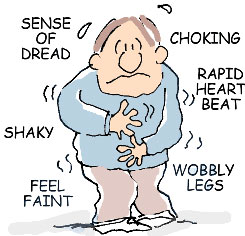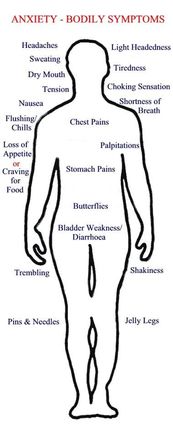
- Your arms, hands, feet, legs, stomach, sides, chest, back, head, or even your whole body feel shaky and you're trembling.
- You feel jittery.
- Your limbs visibly tremble or shake in a way you can't control.
- After you wake up your body is shaking or vibrating for no apparent reason.
- Sometimes you body feels like it's vibrating, although you may not see obvious physical trembling.
Experiencing tremors can be frightening, and many who suffer from them fear a physical illness in addition to their anxiety. They are, however, a symptom of anxiety and not an additional problem.
What causes this phenomena, and how is it linked to anxiety?
Anxiety is linked to our body's natural safety and security mechanism, often known as fight or flight (with a lot of freeze in there as well, depending on the individual.) When the body perceives a potentially dangerous event, if prepares us physically and psychologically to be able to deal with it. Some people prepare to fight, and some to flee - both things that require more energy that we generally have to hand. This state of hyper-arousal exists for many anxiety sufferers as a semi-permanent acute-stress response, and is the cause of the tremors.
When you suffer from anxiety, your fight or flight response is triggered even when there's no danger. This is especially common in anxiety sufferers who experienced some form of abuse as children and have developed hyper-arousal as an almost constant state. It's also a common characteristic of sufferers of clinical PTSD.
Physiologically, when in this state your body releases adrenaline in large amounts. Muscles tighten, awareness is heightened, and our reaction time speeds up - with decisions almost being made by our bodies without us having a chance to even think about them. Shaking is a common part of this, and as the danger passes, a person will typically revert to their standard pretty quickly.
But the person who finds themselves in this state regularly will find that symptoms (tremors, jitteriness, exhaustion, dry mouth) can become more pronounced, even occurring after sleep!
If this sounds familiar, you can be assured that this is natural, and isn't doing you any lasting damage.
While some GP's may try to prescribe beta-blocks to a person suffering tremors, Beyond Blue suggest that in general, there's no evidence that for most people, beta-blockers are any better than placebo.

The first is to learn and use short-term measures to calm yourself. Generally, a breathing exercise will be sufficient, although a chronic sufferer may take some time to learn how to make it work well - I highly recommend that you persist.
Secondly, enter therapy where, over time, you can re-learn how to be in the world so that ultimately your body will learn that it is in fact safe, and the stress response won't trigger. It does work, and your body will find calm at some point. Once you are able, learn to meditate, or perhaps start yoga as these will both teach your brain how to be calm.
Know that during a period of real stress (work or relationship stress for example) may trigger tremors to recur, as will a period of a lack of sleep.
I realise it's easy to make these statements in a short article such as this. The reality is harder, more exhausting, and more frustrating. Enlist family and friends, health professionals, and a therapist you trust to help you in your quest to overcome your anxiety, taking back control of your life from it.
www.youngdiggers.com.au/fight-or-flight
http://learn.beyondblue-elearning.org.au/workplace/resources/pdf/topic5/GuideToWhatWorksForAnxiety.pdf
http://www.anxietycentre.com/index.shtml


 RSS Feed
RSS Feed